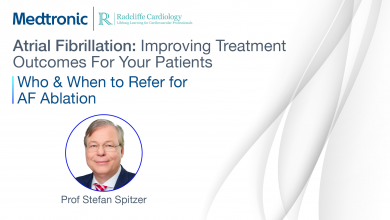Search results
Author(s):
Laurent Fauchier
Added:
3 years ago
Hypothetically, 3-hydroxy-3-methylglutaryl co-enzyme A (HMG-CoA) reductase inhibitors (statins) protect against arrhythmias in addition to their well-established secondary prevention benefits against atherosclerotic coronary artery disease. The use of statins has been suggested to protect against atrial fibrillation (AF) in some clinical studies, but remains rather inadequately explored…
View more
Author(s):
Nadzeya Kuzniatsova
,
Gregory YH Lip
Added:
3 years ago
Atrial fibrillation (AF) is the most common cardiac rhythm disorder in everyday clinical practice, affecting 1–2% of the general population. The prevalence of AF is strongly age-dependent, increasing from <1% in patients under 60 years of age to almost 10% in patients 80 years of age or older1 and 17.8% in those 85 years of age and above.2 Population-based studies have shown lifetime risks for…
View more
Author(s):
Zenawit Girmatsion
,
Joachim R Ehrlich
Added:
3 years ago
Atrial fibrillation (AF) alters the function of the heart beyond mere changes in cardiac rhythm. It has been associated with untoward clinical outcomes in patients, such as the development of heart failure and stroke. Recent years have brought attention to several aspects of AF-associated alterations termed ‘remodelling’. This article will provide an overview of pertinent aspects of this subject…
View more
Author(s):
Patrick Wong
Added:
3 years ago
The heterogeneous nature of atrial fibrillation presents unique challenges, especially in terms of management options. Physicians are now offered a plethora of therapeutic options and targets. These options include the various classes of the established antiarrhythmic drugs (AADs), as well as newer options, rate-controlling drugs and ablation procedures. Beyond the various management options, the…
View more
Author(s):
Jason G Andrade
Added:
8 months ago
Author(s):
Stefan Spitzer
Added:
2 years ago
Identify which patient groups are most likely to benefit from Atrial Fibrillation ablation and the optimal time for patient referral in this video with Professor Dr Stefan Spitzer.
Key Learning Objectives:
Which patients are likely to benefit most from ablation
When to refer for ablation
Practical guidance for improving access to ablation for relevant patients
Additional Learning…
View more
Ep 3: Atrial Fibrillation in Congenital Heart Disease
Author(s):
Irene Martín de Miguel
Added:
2 years ago
Podcast Episode
Author(s):
Jose L Merino
,
José López-Sendón
Added:
3 years ago
Atrial fibrillation (AF) is the most frequent sustained arrhythmia. The estimation is that five million people suffer the disease in Europe,1 although this number may be even higher because many AF episodes are silent but still associated with a risk of complications.2–4 AF prevalence is increasing in developed countries in part due to the progressive increase in the mean age of the western…
View more
Author(s):
Eric Prystowsky
,
Jean-Yves Le Heuzey
Added:
3 years ago
For decades, conventional wisdom suggested that sinus rhythm was preferred over rate control in the treatment of patients with atrial fibrillation (AF). Recent randomised trials have been unable to substantiate this viewpoint, and the occurrence of serious outcomes for patients has been similar for both treatment strategies.1,2
More specifically, several large, randomised, prospective clinical…
View more
Author(s):
Tonje A Aksnes
,
Markus P Schneider
,
Sverre E Kjeldsen
,
et al
Added:
3 years ago
The renin–angiotensin system (RAS) has an important role in many cardiovascular diseases, such as hypertension, left ventricular hypertrophy, atherosclerosis and heart failure, and lately its relationship with cardiac arrhythmias has also been investigated.1 Atrial fibrillation is the most frequently occurring sustained cardiac arrhythmia and its prevalence doubles with each advancing decade of…
View more












 « First
« First